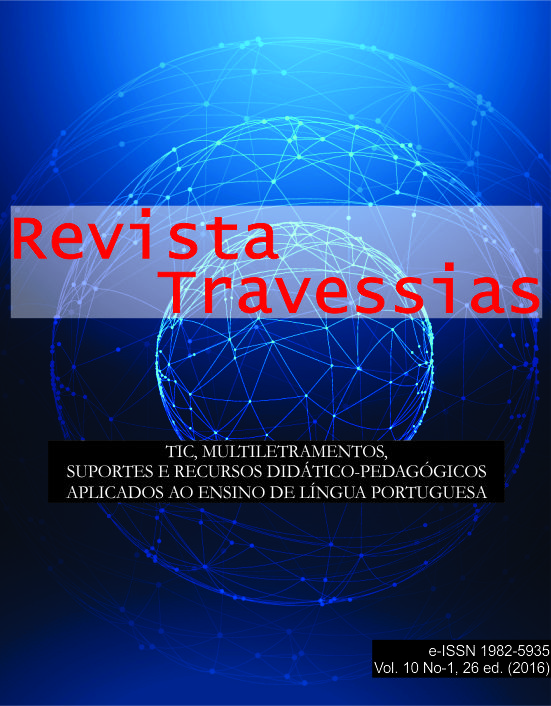A dialogue with the past and a future projection: history, verismo and dystopia in Hunger Games
Keywords:
Dystopia, history, juvenile literature.Abstract
Juvenile literature is recurrently identified as gender connected to the reader in training and the references to the wonderful universe and the utopia. These characteristics are unquestionable, however, this genre is an art form that can be opened to other forms of representation and aesthetic proposition that allow different ways of recreation of reality. Based on this argument, the objective of this study is to analyze the Hunger Games trilogy, written by Suzanne Collins, from the perspective of dystopia and the concept of new verismo, or new realism, from Italian vero, that means "true". These categories of analysis are present throughout the trilogy, forming the basis on which develops narration, which presents a complex reality projected into the future, however, with past echoes. This analysis seeks to observe how are articulated some dystopia elements in the narrative and how the text projects a dialogue, sometimes meticulous, with aspects from ancient history and contemporary social and cultural relations.Downloads
References
BAKHTIN, M. Estética da Criação Verbal. São Paulo: Martins Fontes, 1992.
Brandão, Junito de Souza. Mitologia Grega. Vol. II. São Paulo: Vozes, 1997.
CAMPBELL, Joseph. The order and the other: power and subjectivity in young adult science fiction and dystopian literature for adolescents. Illinois: Illinois State University, 2010.
CANDIDO, Antonio. Literatura e Sociedade. 8.ed. São Paulo: T.A. Queiroz Editor, 2000.
COLLINS, Suzanne. Jogos Vorazes. Trad. Alexandre D’Elia. Rio de Janeiro: Rocco, 2010.
______. Em chamas. Trad. Alexandre D’Elia. Rio de Janeiro: Rocco, 2011a.
______. A Esperança. Trad. Alexandre D’Elia. Rio de Janeiro: Rocco, 2011b.
COLOMER, Tereza. A formação do leitor literário: narrativa infantil e juvenil atual. São Paulo: Global, 2003.
CORSO Diana; CORSO, Mário. Ficções sobre adolescentes. In.: ______. A psicanálise na terra do nunca: ensaios sobre a fantasia. Porto Alegre: Penso, 2011.
DICIONÁRIO mitológico, histórico e geográfico. Trad. José Bento Said. Lisboa: Officina das filhas de Lino da Silva Gocinho, 1822. Digitalizado pela Biblioteca nacional de Portugal. Disponível em http://bdlb.bn.br/acervo/handle/123456789/6933. Acesso em 20 de fev. 2016
ELIADE, Mircea. O sagrado e o profano. Trad. Rogério Fernandes. São Paulo: Martins Fontes, 1992.
FERREIRA, José Ribeiro. Labirinto e Minotauro: mito de ontem de hoje. Coimbra, Portugal: Fluir Perene, 2008.
FOCAULT, Michel. Vigiar e punir. Petrópolis: Vozes, 2012.
GOODREADS. The dystopian timeline to the Hunger Games [Infográfico]. 21 mar. 2012. Disponível em: <http://www.goodreads.com/blog/show/351-the-dystopian-timeline-to-the-hunger-games-infographic> Acesso em: fev. 2016.
HUXLEY, ALDOUS. Admirável mundo novo. Trad. Lino Valandro e Vidal Serrano. 2. ed. Rio de Janeiro: Ed. Globo, 2007.
KOCH, Ingedore G. V. Intertextualidade: diálogos possíveis. São Paulo: Cortez, 2007.
MAINGUENEAU, Dominique. O contexto da obra literária. São Paulo: Martins Fontes, 1995.
ORWELL, George. 1984. Trad. Wilson Veloso. 11. ed. São Paulo: Companhia Editora Nacional, 1978.
ROSTOVTZEFF, Michael I. História de Roma. 4. ed. Rio de Janeiro: Zahar Editores, 1977.
SANTAELLA, Lúcia. O que é semiótica. São Paulo: Brasiliense, 1983.
T. S. Elliot. Quatro Quartetos. Trad. Maria Amélia Neto. 3. ed. São Paulo: Ática, 1983.
Downloads
Published
How to Cite
Issue
Section
License
Creative Copyright Notice
Policy for Free Access Journals
Authors who publish in this journal agree to the following terms:
1. Authors keep the copyright and grant the journal the right of first publication, with the work simultaneously licensed under the Creative Commons Attribution License, which allows sharing the trial with acknowledgment of authorship and initial publication in this journal.
2. Authors are authorized to take additional contracts separately, for non-exclusive distribution of the work version, published in this journal (eg publish in institutional repository or as a book chapter), with acknowledgment of authorship and initial publication in this journal.
3. Authors are allowed and encouraged to publish and distribute their work online (eg in institutional repositories or on their personal page) at any point before or during the editorial process, as this can generate productive changes, as well as increase both impact and citation of the published trial (See The Effect of Free Access).
Creative Commons License
This work is licensed under a Creative Commons Attribution–NonCommercial-shareaswell 4.0 International License, which allows you to share, copy, distribute, display, reproduce, completely or part of the work, since there is no commercial purpose, and authors and source are cited.



